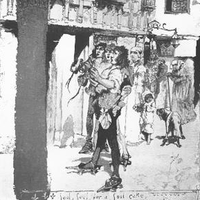Halloween Origins 6 of 8: Soul Cakes
Halloween Orígenes 6 de 8: Pasteles de almas
Halloween Origins 6 of 8 : Les gâteaux de l'âme
Cadılar Bayramı Kökenleri 6 / 8: Ruh Kekleri
萬聖節起源 6 of 8:靈魂蛋糕
Halloween is an annual holiday celebrated each year on October 31, and Halloween 2018 occurs on Wednesday, October 31.
It originated with the ancient Celtic festival of Samhain, when people would light bonfires and wear costumes to ward off ghosts.
||||||||Samhain||||||||||||
In the eighth century, Pope Gregory III designated November 1 as a time to honor all saints; soon, All Saints Day incorporated some of the traditions of Samhain.
The evening before was known as All Hallows Eve, and later Halloween.
Over time, Halloween evolved into a day of activities like trick-or-treating, carving jack-o-lanterns, festive gatherings, donning costumes and eating sweet treats.
Soul Cakes: The North American Halloween tradition of “trick-or-treating” probably dates back to the early All Souls' Day parades in England.
||||||||||||||||||||||Anglii
||||||||||||||||||Almas||desfiles||
Кексы душ: Североамериканская традиция Хэллоуина «конфеты или гадости», вероятно, восходит к ранним парадам Дня всех душ в Англии.
During the festivities, poor citizens would beg for food and families would give them pastries called “soul cakes” in return for their promise to pray for the family's dead relatives.
||||||||||||||выпечку|||||||||||||||
||||||mendigar|||||||||||||||||||||||
|||biedni|||||||||||ciastka|||||||||||||||
||||||||||||||糕点|||||||||||||||
Во время празднований бедные граждане просили еду, а семьи давали им пирожные, называемые «кексами душ», в обмен на их обещание помолиться за мертвых родственников семьи.
The distribution of soul cakes was encouraged by the church as a way to replace the ancient practice of leaving food and wine for roaming spirits.
||||||||||||||заменить|||||||||||
||||||||||||||||||||||||wędrujących|
||||||||||||||||||||||||游荡的|
Распределение кексов душ поощрялось церковью как способ заменить древнюю практику оставлять еду и вино для бродячих духов.
The practice, which was referred to as “going a-souling” was eventually taken up by children who would visit the houses in their neighborhood and be given ale, food and money.
|||||||||душевание||||||||||||||||||пиво|||
|||||||gehen|||||||||||||||||||||||
|||była||||||duszenie||||||||||||||||||piwo|||
|||||||||||||||||||||||||||啤酒|||
Практика, которую называли «поход за душами», в конечном итоге была принята детьми, которые посещали дома в своем районе и получали пиво, еду и деньги.
The tradition of dressing in costume for Halloween has both European and Celtic roots.
|||||||||||||raíces
Традиция наряжаться в костюмы на Хэллоуин имеет как европейские, так и кельтские корни.
Hundreds of years ago, winter was an uncertain and frightening time.
|||||||||aterrador|
Сотни лет назад зима была неопределенным и пугающим временем.
Food supplies often ran low and, for the many people afraid of the dark, the short days of winter were full of constant worry.
|||变得||||||||||||||||||||
Запасы еды часто заканчивались, и для многих людей, боящихся темноты, короткие зимние дни были полны постоянных тревог.
On Halloween, when it was believed that ghosts came back to the earthly world, people thought that they would encounter ghosts if they left their homes.
||||||||||||земной|||||||||||||
|||||||||||||||||||geistern begegnen||||||
||||||||||||ziemskim|||||||||||||
На Хэллоуин, когда считалось, что духи возвращаются в земной мир, люди думали, что они встретят призраков, если покинут свои дома.
To avoid being recognized by these ghosts, people would wear masks when they left their homes after dark so that the ghosts would mistake them for fellow spirits.
Чтобы избежать опознания этими призраками, люди надевали маски, когда выходили из своих домов после наступления темноты, чтобы призраки приняли их за соплеменников.
On Halloween, to keep ghosts away from their houses, people would place bowls of food outside their homes to appease the ghosts and prevent them from attempting to enter.
|||||||||||||||||||успокоить|||||||||
|||||||||||||||||||beruhigen|||||||||
||||||||||||miski|||||||uspokoić|||||||||
|||||||||||||||||||安抚|||||||||
В Хэллоуин, чтобы защитить свои дома от призраков, люди ставили миски с едой снаружи своих домов, чтобы умилостивить призраков и предотвратить их попытки войти.

